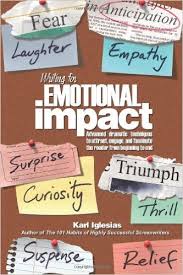 "Writing for Emotional Impact" by Karl Iglesias
"Writing for Emotional Impact" by Karl Iglesias I've sent the list of books (below) to many young screenwriters. There are tons more, not an exaggeration, but these several books are great places to start to help you learn the foundation for good story and structure. Of course, writing truly is rewriting. Your first draft is never the finished product, nor do you want it to be. In the rewrite, you should hear your characters more clearly, and thereby, adjust their actions. Character action should be based on motivation born out of who they are, not based on what you want them to do. It's a fine line and easily crossed. The books below are simply guides to help you understand the fundamentals to good screenwriting like the aforementioned and many more.
For Instance...
I write great dialogue, or so I've been told many times. I found an amazing book early on in my writing career that forever impacted how I approach my characters, and what they would say. Dialogue is more than talking, more than simply conveying a story point. Dialogue is it's own multi-layered universe. It must move the story, tell us about the character, sound natural and fluid while not being stale or pedantic It's, most assuredly, not how people talk, but it better sound like words your character would say. A good rule of thumb or test is to remove the character names above the dialogue and determine if each characters' words sounds distinctly different. I tend to write with multiple characters, and I do this test frequently. Each character should have a sound, a voice, so unique that you don't even need their names to distinguish who's talking. Now this won't always be the case when you have "Laundry Guy 1" and "Laundry Girl 2" and that may be why the exchange is funny because they both sound so much alike. However, generally speaking, you need to always be aware of the words you are putting in your characters mouth. If those words are exciting and leap off the page, you will surely attract A-List talent who will be excited to transform into your character just for a chance to say those words.
I love great dialogue but that is not the only part of a great screenplay--the story--duh! Check out the books below.... They will help you learn everything else. Happy reading and as always...
Love,
Lorna O.
QUINTESSITIAL SCREENWRITING BOOKS
Robert McKee “Story: Substance, Structure, Style and the Principles of Screenwriting”
Note: You need to have a great sense of structure. It's the foundation of your script. This is the book.
Karl Iglesias “Writing for Emotional Impact”
Note: Phenomenal! Changed my writing for the better.
Linda Seger “Making a Good Script Great” and
“Making a Good Writer Great: A Creativity Workbook for Screenwriters”
Note: Solid books on how to approach your rewrite.
Syd Field “The Screenwriter's Problem Solver: How to Recognize, Identify, and Define Screenwriting Problems” and “Screenplay: The Foundations of Screenwriting”
Note: Great books on screenplay structure. Very much in line with the Robert McKee book.
Christopher Vogler “The Writers Journey: Mythic Structure for Writers”
Note: Extraordinary way to determine what kind of story you want to tell and how to structure it.
Blake Snyder “Save The Cat! The Last Book on Screenwriting You'll Ever Need”
Note: It's a fantastic book hands down! BUT. You'll definitely need other books.
*Rib Davis “Writing Handbook: Writing Dialogue for Scripts”
Note: This was my first and best handbook on dialogue for scripts
James Scott Bell “How to Write Dazzling Dialogue: The Fastest Way to Improve Any Manuscript”
Note: Superb dialogue is a must!
ON HOW TO WRITE WELL
Note: Really loved the tips found in these books. They are great for any type of writer... if you're interested.
Steven Pinker “The Sense of Style: The Thinking Person’s Guide to Writing in the 21st Century”
Roy Peter Clark “Writing Tools: 50 Essential Strategies for Every Writer”
William Zinsser “On Writing Well: The Classic Guide to Writing Nonfiction”
 RSS Feed
RSS Feed
